Hyundai Bayon vs Hyundai IONIQ 5 - Differences and prices compared
Compare performance (90 HP vs 650 HP), boot space and price (20100 £ vs 38500 £ ) at a glance. Find out which car is the better choice for you – Hyundai Bayon or Hyundai IONIQ 5?
Costs and Efficiency:
Price and efficiency are often the first things buyers look at. Here it becomes clear which model has the long-term edge – whether at the pump, the plug, or in purchase price.
Hyundai Bayon has a clearly advantage in terms of price – it starts at 20100 £ , while the Hyundai IONIQ 5 costs 38500 £ . That’s a price difference of around 18428 £.
Engine and Performance:
Power, torque and acceleration say a lot about how a car feels on the road. This is where you see which model delivers more driving dynamics.
When it comes to engine power, the Hyundai IONIQ 5 has a clearly edge – offering 650 HP compared to 90 HP. That’s roughly 560 HP more horsepower.
In acceleration from 0 to 100 km/h, the Hyundai IONIQ 5 is clearly quicker – completing the sprint in 3.50 s, while the Hyundai Bayon takes 11.90 s. That’s about 8.40 s faster.
There’s also a difference in torque: Hyundai IONIQ 5 pulls decisively stronger with 770 Nm compared to 172 Nm. That’s about 598 Nm difference.
Space and Everyday Use:
Cabin size, boot volume and payload all play a role in everyday practicality. Here, comfort and flexibility make the difference.
Both vehicles offer seating for 5 people.
In curb weight, Hyundai Bayon is significantly lighter – 1175 kg compared to 1955 kg. The difference is around 780 kg.
In terms of boot space, the Hyundai IONIQ 5 offers clearly perceptible more room – 520 L compared to 411 L. That’s a difference of about 109 L.
When it comes to payload, Hyundai IONIQ 5 to a small extent takes the win – 530 kg compared to 460 kg. That’s a difference of about 70 kg.
Who wins the race in the data check?
The Hyundai IONIQ 5 holds a decisive overall lead in the objective data comparison.
This result only shows which model scores more points on paper – not which of the two cars feels right for you.
Costs and Consumption
View detailed analysis
Engine and Performance
View detailed analysis
Dimensions and Body
View detailed analysis
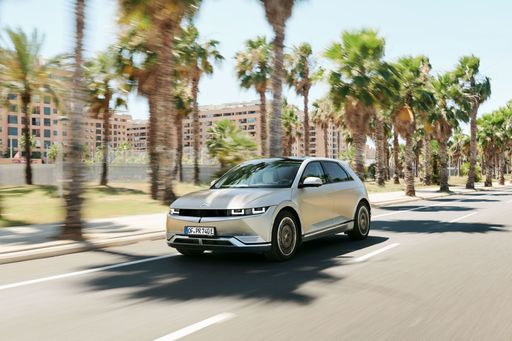
Hyundai IONIQ 5
Hyundai Bayon
The Hyundai Bayon slips neatly between city runabout and small SUV, offering surprising practicality and a fresh, confident design that stands out in urban traffic. It's an easy buy for shoppers who want smart packaging, tidy handling and a dash of personality without fuss — a sensible little crossover that makes everyday driving a bit more enjoyable.
details




Hyundai IONIQ 5
The Hyundai IONIQ 5 looks like a spaceship that moved into suburbia, pairing bold retro‑futuristic styling with a roomy, cleverly laid-out cabin that makes long trips surprisingly comfortable. Its electric character delivers instant, silky acceleration and low running costs, making it a smart, slightly cheeky pick for buyers who want tech, practicality and personality without the drama.
details
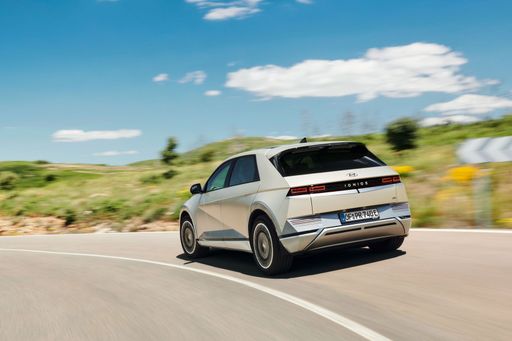
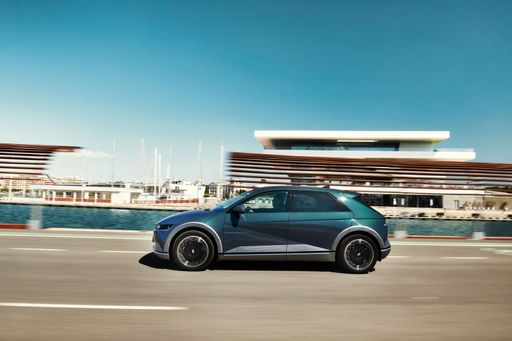
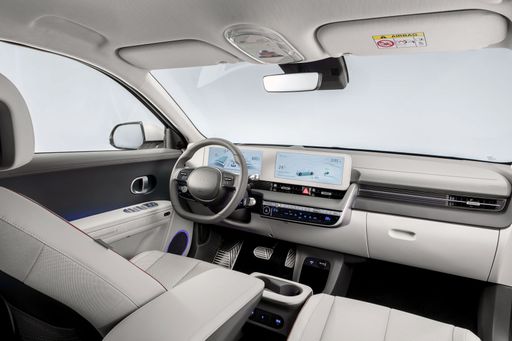
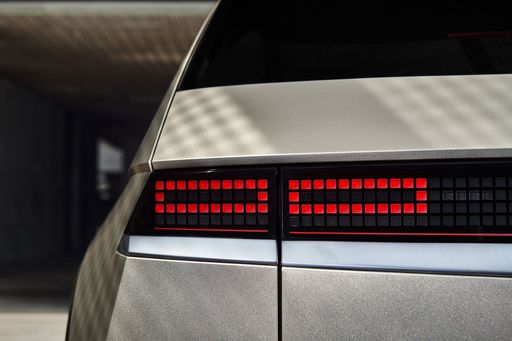
Costs and Consumption |
|
|---|---|
|
Price
20100 - 25800 £
|
Price
38500 - 64200 £
|
|
Consumption L/100km
5.80 L
|
Consumption L/100km
-
|
|
Consumption kWh/100km
-
|
Consumption kWh/100km
15.6 - 21.2 kWh
|
|
Electric Range
-
|
Electric Range
440 - 570 km
|
|
Battery Capacity
-
|
Battery Capacity
63 - 84 kWh
|
|
co2
130 - 132 g/km
|
co2
0 g/km
|
|
Fuel tank capacity
-
|
Fuel tank capacity
-
|
Dimensions and Body |
|
|---|---|
|
Body Type
SUV
|
Body Type
SUV
|
|
Seats
5
|
Seats
5
|
|
Doors
-
|
Doors
5
|
|
Curb weight
1175 - 1200 kg
|
Curb weight
1955 - 2275 kg
|
|
Trunk capacity
411 L
|
Trunk capacity
480 - 520 L
|
|
Length
-
|
Length
4655 - 4715 mm
|
|
Width
1775 mm
|
Width
1890 - 1940 mm
|
|
Height
-
|
Height
1585 - 1605 mm
|
|
Max trunk capacity
-
|
Max trunk capacity
1540 - 1580 L
|
|
Payload
450 - 460 kg
|
Payload
385 - 530 kg
|
Engine and Performance |
|
|---|---|
|
Engine Type
Petrol
|
Engine Type
Electric
|
|
Transmission
Manuel, Automatic
|
Transmission
Automatic
|
|
Transmission Detail
Manual Gearbox, Dual-Clutch Automatic
|
Transmission Detail
Reduction Gearbox
|
|
Drive Type
Front-Wheel Drive
|
Drive Type
Rear-Wheel Drive, All-Wheel Drive
|
|
Power HP
90 HP
|
Power HP
170 - 650 HP
|
|
Acceleration 0-100km/h
11.9 - 13.3 s
|
Acceleration 0-100km/h
3.5 - 8.5 s
|
|
Max Speed
-
|
Max Speed
185 - 260 km/h
|
|
Torque
172 Nm
|
Torque
350 - 770 Nm
|
|
Number of Cylinders
3
|
Number of Cylinders
-
|
|
Power kW
66 kW
|
Power kW
125 - 478 kW
|
|
Engine capacity
998 cm3
|
Engine capacity
-
|
General |
|
|---|---|
|
Model Year
2025
|
Model Year
2024 - 2025
|
|
CO2 Efficiency Class
D
|
CO2 Efficiency Class
A
|
|
Brand
Hyundai
|
Brand
Hyundai
|
What drivetrain options does the Hyundai Bayon have?
The Hyundai Bayon is available as Front-Wheel Drive.




